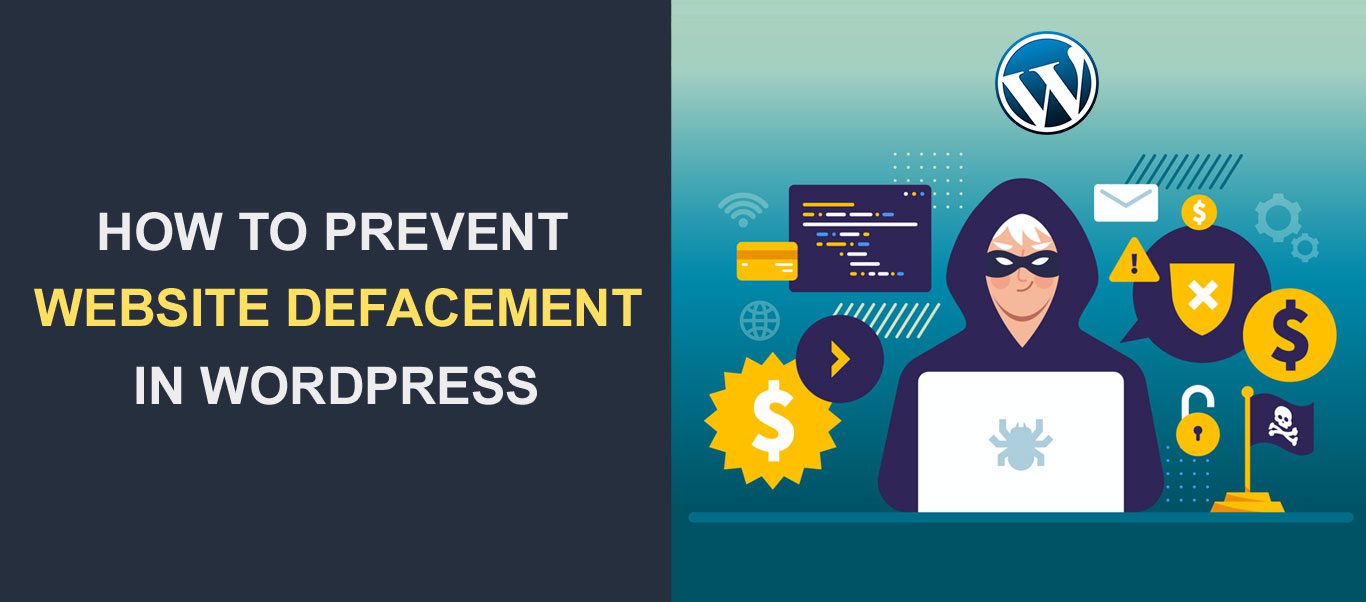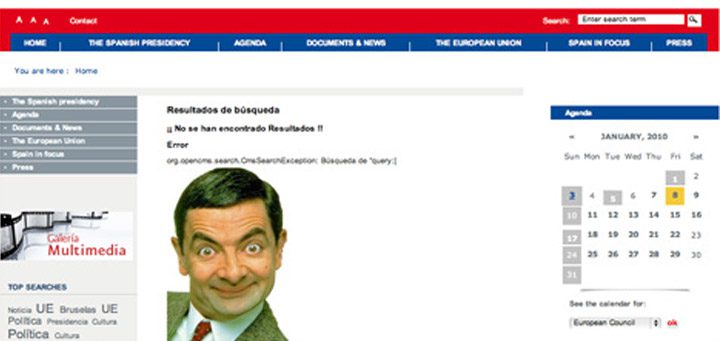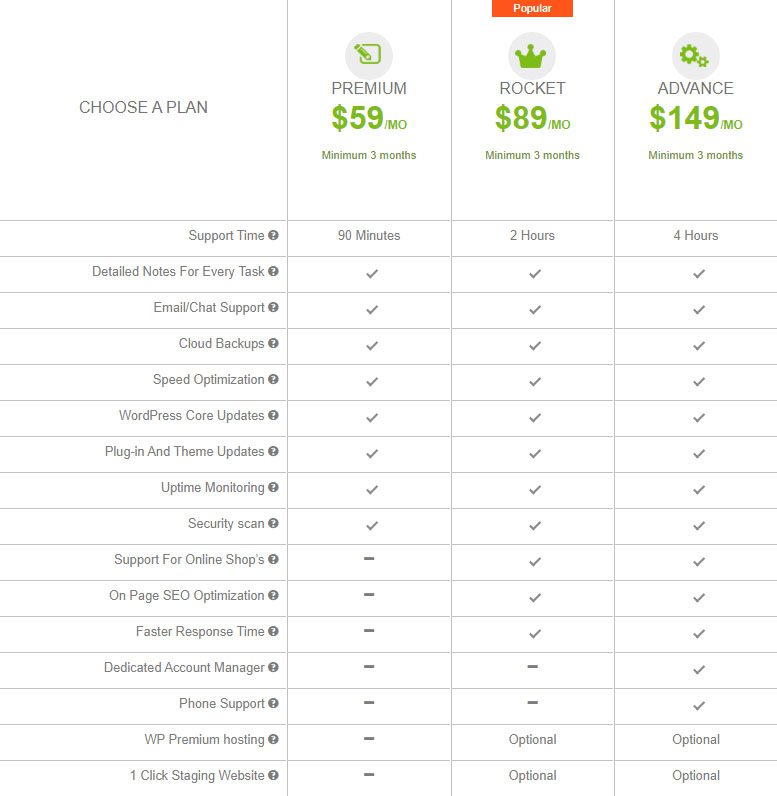What Is and How to Prevent Website Defacement in WordPress
 Millions of people have launched websites without writing a line of code. That is thanks to WordPress’ ease of use and user-friendliness. As a result of its mass adoption by casual users, hackers and cybercriminals have studied the vulnerabilities of the platform. A single zero-day vulnerability is enough for a skilled hacker to compromise hundreds of websites a day. The themes and plugins needed to run a website are huge vulnerabilities from a security perspective. Sadly, WordPress websites are a target for hackers and website defacement due to the number of vulnerabilities. The more successful WordPress is, the more cybercriminals will be interested in it.
Millions of people have launched websites without writing a line of code. That is thanks to WordPress’ ease of use and user-friendliness. As a result of its mass adoption by casual users, hackers and cybercriminals have studied the vulnerabilities of the platform. A single zero-day vulnerability is enough for a skilled hacker to compromise hundreds of websites a day. The themes and plugins needed to run a website are huge vulnerabilities from a security perspective. Sadly, WordPress websites are a target for hackers and website defacement due to the number of vulnerabilities. The more successful WordPress is, the more cybercriminals will be interested in it.
That’s a fact, and you have to adapt to this context! A proactive approach, in addition to a few best practices, will strengthen your site security. Start your fight against hackers. Learn what website defacement in WordPress is as well as how to prevent this issue.
Website Defacement
Even though this expression might be strange to you, chances are you have seen plenty of examples of website defacements. It’s a method of online vandalism where cybercriminals take control of websites and alter the visual content. It can take many shapes, but the point is to show a bold message to as many people as possible. Practically, hackers replace your site’s web pages with a simple webpage to publish a statement. In most cases, it’s related to ideologies, governmental wrongdoings, and public issues. The hacking group’s name is usually added to the website’s homepage in addition to a short message. In other instances, a longer message replaces the entire website.
Public shaming, revenge, showing off hacking skills, and financial recompensation are the main reasons why cybercriminals engage in website defacement. Anyway, it’s a nightmare for a website admin to face such an issue. Often, website defacement happens to governmental and institutional websites. It’s usually a form of defiance against governments and politicians. But that doesn’t mean you’re safe, just because your site doesn’t fall into these categories. Hackers may penetrate your site and vandalize it just for fun or financial recompensation. You are never out of danger!
The Consequences of Website Defacement

(source: Bermix Studio)
Website defacement is a form of hacking, but its consequences are different. For example, hackers ask for financial recompensation when they get control of your site or infect it with malware. Nobody is interested in the purpose of the hack or the hacker’s identity and beliefs. In the instances of defacement attacks, it’s different. Usually, cybercriminals want to speak out about an issue they consider crucial. That’s why a heavily visited website is a huge attraction for them. In other words, website defacement is about ideas, beliefs, and public messages. Other hacking attacks, on the other hand, are about money and data gathering. The consequences of a defaced website are consistent and therefore affect you in the long term. The following consequences have the biggest impact on your business.
Public Shaming
A defaced website puts you in a bad light. The more people who see your defaced website, the worse it is for your business. It’s quite ridiculous to get notified, not that your site is down, but that it’s displaying a shaming message. In some situations, the message of the hackers is controversial, insulting, or has sexual connotations. Certainly, a defaced website is nothing to brag about!
Zero Credibility
Would you trust and give your card details to a business that has a defaced website? I doubt it. If you are the victim of website defacement, consequently your customers will question your credibility. Don’t forget, credibility is your business’s most valuable asset.
Negative Image
You need cold blood, webmaster skills, and a recent backup to resolve the issue of website defacement. Public apologies and an honest explanation should help limit the effects. However, the business’s image will remain affected in the long term. Some famous defaced websites will enter into history. Dozens of articles will feature them, as we do in the next paragraph.
Famous Cases of Defaced Websites
Mass media has reported a few defacement attacks. Many of the target websites were maintained by large or state organizations. Defacements are the most humiliating types of cyberattacks between state actors. There is nothing more embarrassing than having no power over demeaning messages on your own website. Check out the following cases to get a better idea of the magnitude of defacement attacks.
Anonymous’ Cyber War Against Russia

(Source: Cybernews)
In support of Ukraine, Anonymous declared cyberwar against Russia. As a result, tens of websites were defaced. The messages are addressed to Russians and advise them to cease military operations. The defaced websites are both state-run and private news agencies heavily visited by Russians.
Anonymous brought defacement to a superior level. The hackers managed to deface even TV channels. Twitter is full of videos showing how Russian TV channels were hacked and broadcast fights from Ukraine. Practically, Anonymous took control of the TV channels to broadcast their messages. Besides, the TV channels and website defacements paint the cyber authorities from Russia in a bad light.
51 US Governmental Websites
The US Army killed Iranian general Qasem Soleimani in 2020. As revenge, a group of cybercriminals defaced 51 US governmental websites. The websites displayed a photo of the Iranian general and offending messages to the US like “Down with America.” Similar to Anonymous’ attacks on Russian websites, it’s quite frightening that US and Russian experts didn’t manage to prevent such powerful attacks.
(Source: Zdnet)
UK National Health Service

(Source: BBC)
AnoaGhost is a cybercriminal entity that hacked the official website of the UK National Health Service 2018. The effects were minimal because the NHS security experts took down the message in a few hours. However, this hack raised many questions about the security of the data managed by the NHS and other similar services.
Mr. Bean Defacement

(Source: Huffpost)
Some defaced websites are funny. Except for the hacked website admins! This is the case of the official website dedicated to the Spanish presidency of the European Union. Every EU country takes the presidency for a six-month term. Spanish authorities created a website to inform people about the activities performed during their term in 2010. Sadly for the Spanish prime minister in that period, Jose Luis Rodriquez Zapatero, the following happened. A photo of Mr.Bean replaced his image on the website. The rest of the website was functional, so most likely the hackers’ intention was to mock Mr. Zapatero.
Best Practices to Prevent Website Defacement in WordPress
Prevention is better than a cure, even in the matter of website defacement. The consequences are severe and affect the credibility of your business. It’s not an exaggeration to say that a defaced website destroys your reputation. WordPress core is pretty secure, but the themes and plugins are major vulnerabilities. Managing a WordPress website is a real provocation because hackers have plenty of potential entry points to your website. There is no such thing as a secure website, but you have to do everything possible to limit the vulnerabilities. Security experts compiled sets of proactive measures to protect your site against cyberattacks. Review the following tips to learn how to do so.
Theme and Plugins Management
The more themes and plugins you use, the more insecure your website is. Use themes and plugins only from secure sources and try to limit the amount you use. You should keep in mind that even the biggest WordPress agencies have security vulnerabilities in their themes and plugins. You should update them periodically to reduce the risks. To summarize:
– limit the number of themes and plugins you use for your site;
– only choose ones from trustworthy sources;
– update them to avoid security issues.
Backups Are Golden
You’re probably tired of reading countless articles about the importance of backups. Many webmasters neglect to keep a recent site copy. Therefore, they end up regretting when hackers infiltrate their sites. Yeah, it’s not attractive at all to install and configure a backup plugin. However, it might be the best decision you ever made in some particular cases. A recent backup is golden in the undesired situation of a website defacement. All you have to do is get access to the site credentials and replace the site files with the backup.
The Principle of the Least Privileged
This principle is simple. Limit the privileges of users’ accounts as much as possible. WordPress has six predefined roles. Those are Super Administrator, Administrator, Editor, Author, Contributor, and Subscriber. Use these roles or create new ones for your team members. Don’t give admin privileges to all users. In security terms, a user is a vulnerability. The more rights a user has, the bigger the vulnerability is. Hackers are less likely to gain admin access to your files when you allow fewer privileged users on your site.
Strong Passwords to Prevent Website Defacement
A strong password is a no-brainer. Yet, hackers take control of thousands of sites a day due to weak credentials. Install a security plugin that forces people to use only strong credentials. You know that length and complexity matter a lot. Each additional character exponentially grows the chance of not getting hacked. Test your credentials by using a password meter like this one from Security.org.
Security Plugins
A security plugin isn’t a guarantee that your site is unhackable. Still, a quality plugin improves your site security, so you must install one. A few free alternatives are available on the WordPress repository. Webmasters needing more security features should pay for premium versions. Check our list of the best security plugins to make an educated decision.
Secure Information Exchange
A website is a flexible entity. The browser permanently exchanges information with the server hosting the site files. You upload new files on the server constantly, and your site is vulnerable during the information exchange. A third-party actor may interpose and get access to the data exchanged. It’s only a matter of time until that third-party entity breaks your site. Hence, secure the information exchange! Use only secure agents to upload files on the root file. Look for a secure FTP agent to ensure that the information you upload is inaccessible to hackers. In addition, an SSL certificate is essential to encrypt the browser-server information exchange. Thankfully, many platforms encourage webmasters by including free SSL certificates in their offers.
Regular Audits
Website security isn’t a set-and-forget job. Indeed, you spend a significant amount of time on security at the website launching. Still, you have to audit the security from time to time. Review users’ activity, their privileges, and the strength of their passwords. Verify the plugins and delete unused ones. Check the configuration of the security plugin. Look at the settings related to the most common types of attacks. Examples are denial of service (DoS), SQL injection, or cross-site scripting (XSS).
Over to You on Website Defacement
Website defacement is a problem typically for governmental and institutional websites. However, you aren’t out of danger! Hackers or even a previous disgruntled employee could attack your site. A shameful message on your homepage is a real nightmare. Website defacement is more than hacking. It impacts your business growth, revenue, and, most importantly, your credibility! A business lacking the trust of customers is a failure!





